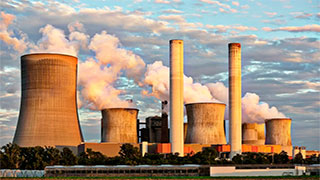




Nuclear energy continues to play a critical role in the European Union’s energy mix, covering approximately 22.8 per cent of total electricity generation, according to former chairman of the Cyprus Energy Regulatory Authority (CERA) Andreas Poullikkas.
In a detailed analysis, Poullikkas stressed that despite divergent national policies, the EU recognises nuclear energy as essential for ensuring energy security and achieving decarbonisation goals.
“The European Union considers nuclear energy a fundamental element of its energy transition strategy, particularly in the journey toward climate neutrality and energy independence,” he said.
“Although some countries like Germany have decommissioned their nuclear plants, others – including France, Hungary, Poland, the Czech Republic, Sweden, and Finland – are actively investing in nuclear energy,” he explained.
“They see it as necessary both for reducing carbon dioxide emissions and for maintaining a stable and reliable power supply.”
The European Commission has classified nuclear fission as a ‘transitional technology’ under the EU Taxonomy for Sustainable Investments.
This designation allows for the funding of nuclear projects, provided strict conditions are met regarding safety and waste management.
“The EU’s approach to nuclear energy is complex,” Poullikkas noted.
“There are major disagreements among Member States, especially when it comes to safety concerns, construction costs, and radioactive waste management,” he added.
On the one hand, he pointed out, nuclear energy offers a stable, abundant, and carbon-free power source.
On the other hand, public concern persists around its safety and long-term sustainability.
“Certain countries are pushing nuclear forward, while others are resisting – largely due to lingering fears and financial concerns,” he said.
Nevertheless, the EU views nuclear energy, alongside renewables, as a cost-effective solution to meet growing demand for low-carbon electricity.
Poullikkas underscored the potential of Small Modular Reactors (SMRs), a newer generation of nuclear technology.
“The EU sees SMRs as a promising technological solution for the green transition, especially when integrated with renewables,” he stated.
“SMRs are typically up to 300 megawatts, much smaller than conventional nuclear reactors which exceed 1000 megawatts,” he explained.
“They offer unique advantages such as flexible installation, innovative safety features, ease of integration into energy systems, and lower infrastructure requirements,” Poullikkas added.
However, SMRs also face significant challenges. “Public acceptance is a major hurdle – fear of nuclear energy remains strong. Economically, SMRs require mass production to become cost-efficient, and there are regulatory challenges too, as approval requires harmonisation of European safety standards,” he said.
Despite these hurdles, several countries including Sweden, Romania, Poland, and Estonia are moving forward with SMR programmes, and companies like EDF and Rolls-Royce are making substantial investments.
To accelerate development, the EU has launched the European Industrial Alliance on SMRs, aiming to commercialise the technology by the early 2030s.
“This alliance focuses on selecting safe technologies, boosting the European supply chain, removing investment barriers, promoting research, and informing civil society,” Poullikkas said.
He also highlighted that SMRs have been included in the Net Zero Industry Act and acknowledged by the European Parliament as vital to the energy transition.
At the same time, the EU is making strategic investments in nuclear fusion research.
“Fusion energy is regarded as a future, sustainable, and safe power source with the potential to meet global demand. It differs from fission as it produces no long-lived radioactive waste and is accompanied by fewer safety concerns,” he explained.
“The EU is leading in global research efforts to address scientific and technical challenges, train a new generation of scientists, and commit to clean energy,” he said.
“If these technical challenges are overcome, fusion could become the primary energy source in the second half of the 21st century.”
In closing, Poullikkas affirmed the EU’s strategic focus on nuclear energy as a tool for ensuring security of supply and reaching climate neutrality.
“The development of SMRs is being encouraged alongside renewables, but the final decision to adopt them rests with each Member State,” he said.
“At the same time, the EU is investing vigorously in fusion research, aiming for a future of clean, safe, and abundant energy,” Poullikkas concluded.
Source:www.cyprus-mail.com